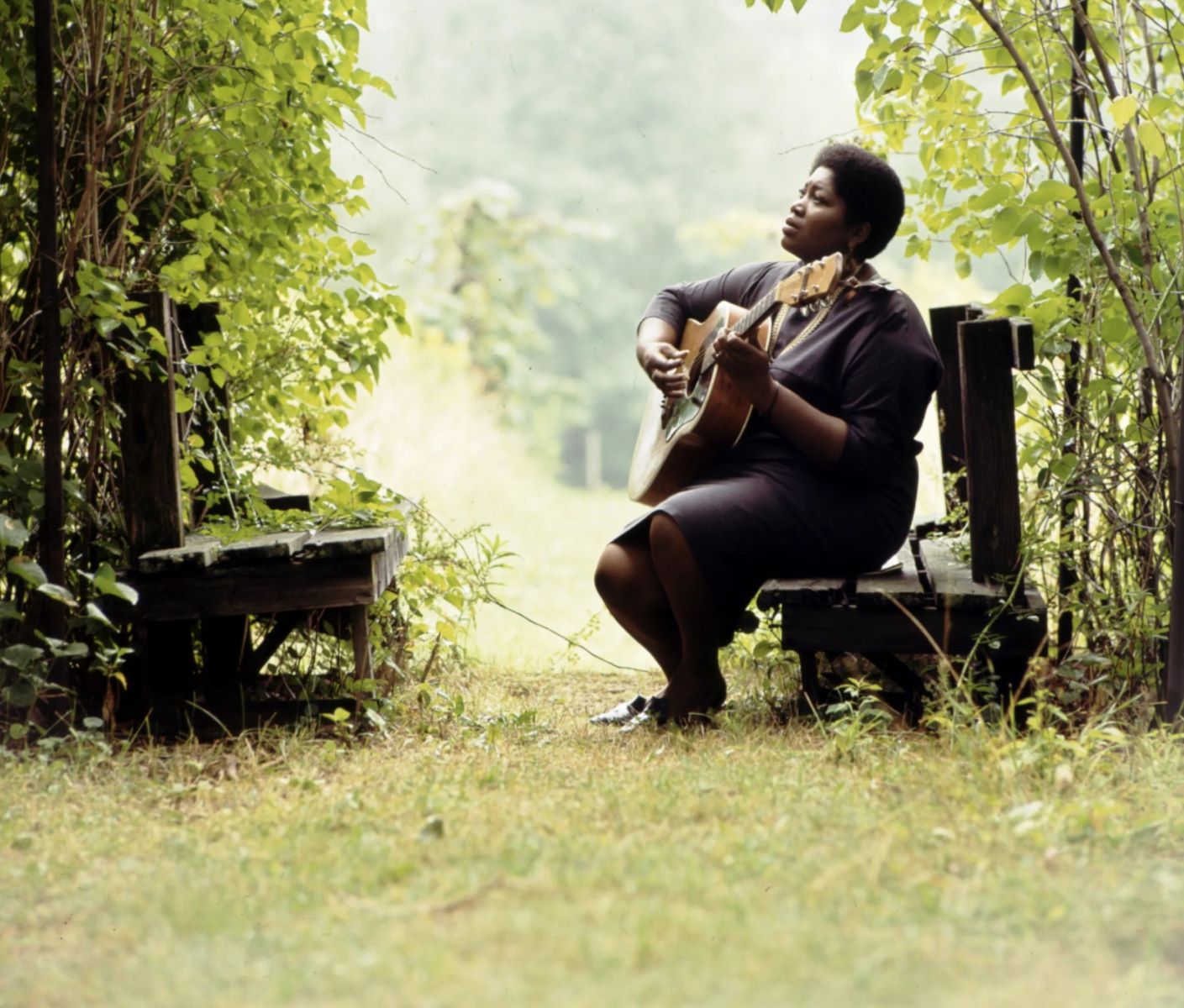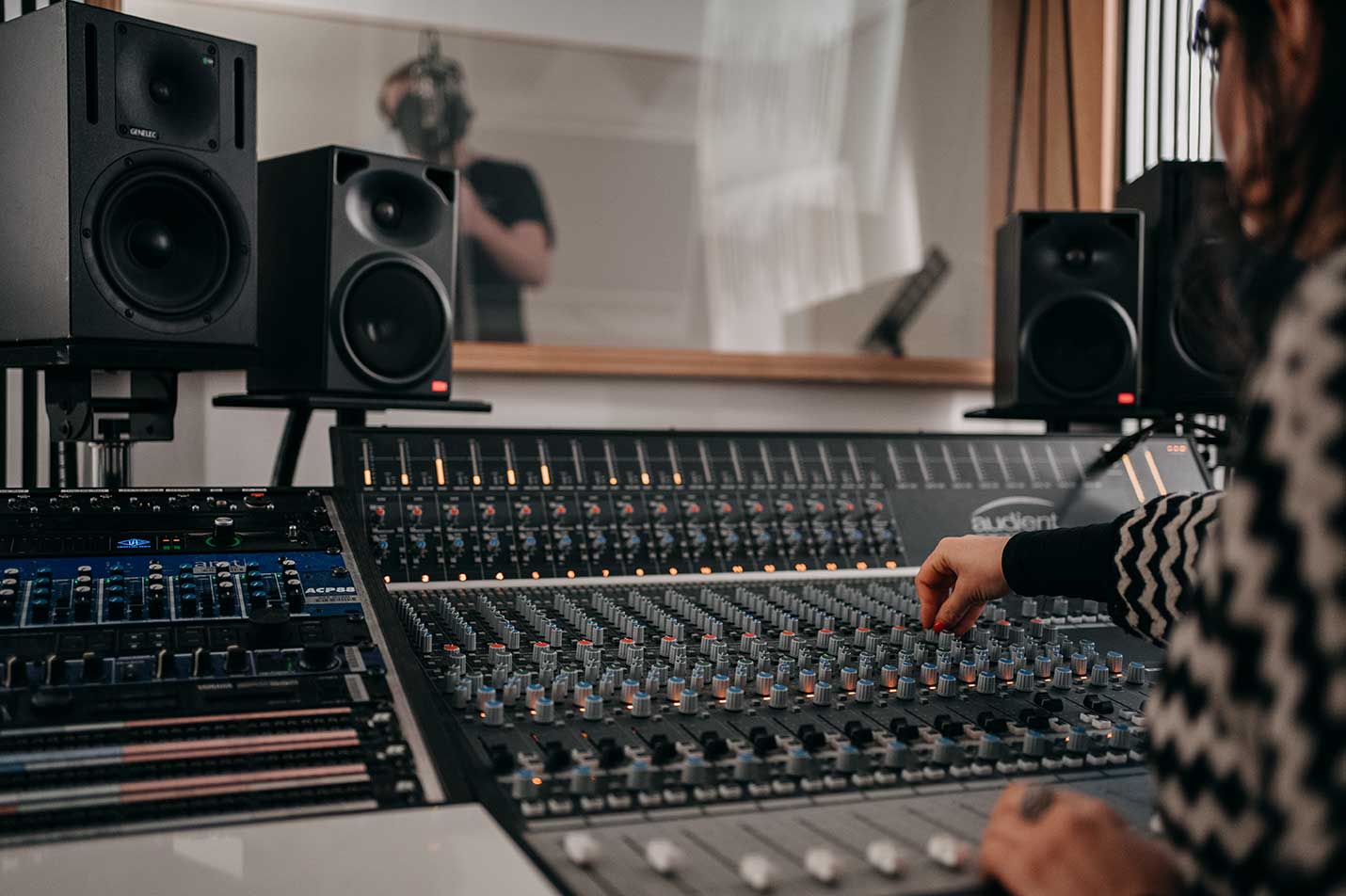Home>Production & Technology>Singer>How To Become A Backup Singer


Singer
How To Become A Backup Singer
Published: February 28, 2024
Learn how to become a backup singer and kickstart your career in the music industry. Discover the essential skills and steps to become a successful singer. Start your journey today!
(Many of the links in this article redirect to a specific reviewed product. Your purchase of these products through affiliate links helps to generate commission for AudioLover.com, at no extra cost. Learn more)
Table of Contents
Introduction
Becoming a backup singer is a rewarding and fulfilling endeavor for those who have a passion for music and performing. While the spotlight often shines on lead vocalists, the role of a backup singer is equally vital in creating a harmonious and captivating musical experience. Whether you dream of gracing the stage alongside renowned artists or adding depth to live performances, embarking on the journey to become a backup singer can be an exciting and enriching pursuit.
As a backup singer, you will play a crucial role in complementing the lead vocalist, adding rich harmonies, and enhancing the overall sound of a musical performance. Your vocal prowess and ability to seamlessly blend with other singers will be essential in creating a cohesive and compelling sonic tapestry. Moreover, backup singers often contribute to the visual appeal of a performance, adding dynamic choreography and stage presence that captivates audiences.
In this comprehensive guide, we will explore the essential steps to help you realize your dream of becoming a backup singer. From honing your vocal skills and mastering harmonies to building performance experience and networking within the music industry, each step is designed to equip you with the knowledge and resources needed to thrive in this competitive yet immensely rewarding field.
Whether you aspire to tour with renowned artists, lend your vocals to studio recordings, or dazzle audiences on the big stage, the path to becoming a backup singer is filled with opportunities for growth, creativity, and artistic fulfillment. By following the insights and strategies outlined in this guide, you will be well-prepared to embark on this exhilarating journey and carve out a successful career as a backup singer. So, let's delve into the essential steps that will set you on the path to realizing your aspirations in the world of backup singing.
Step 1: Develop Your Vocal Skills
Embarking on the journey to become a backup singer necessitates a strong foundation in vocal artistry. Developing your vocal skills is the cornerstone of your journey, laying the groundwork for a successful and enduring career in the music industry. Here's how you can cultivate and refine your vocal abilities to excel as a backup singer:
-
Vocal Training and Technique: Enrolling in vocal training programs or seeking guidance from a reputable vocal coach is paramount. These resources can aid in honing your vocal technique, expanding your vocal range, and enhancing your overall vocal control and agility. Through consistent practice and guidance, you can refine your vocal tone, diction, and expression, enabling you to deliver captivating performances.
-
Breath Control and Support: Mastering breath control is essential for sustaining long notes, executing seamless vocal transitions, and delivering powerful performances. By incorporating breathing exercises and techniques into your practice regimen, you can fortify your breath support, allowing for sustained and controlled vocal delivery.
-
Ear Training and Pitch Accuracy: Developing a keen ear for pitch and harmony is indispensable for a backup singer. Engaging in ear training exercises and practicing vocal harmonies will sharpen your ability to blend with other singers and maintain pitch accuracy, a crucial skill for creating seamless and melodious vocal arrangements.
-
Style Exploration and Versatility: As a backup singer, versatility is key. Exploring various musical styles, such as pop, rock, jazz, and R&B, will expand your vocal repertoire and adaptability. Embracing different vocal styles and genres will equip you to thrive in diverse musical settings, broadening your opportunities as a backup vocalist.
-
Stage Presence and Performance: Beyond vocal prowess, cultivating stage presence and performance skills is vital. Learning to engage with audiences, exude confidence on stage, and convey emotion through your performances will elevate your impact as a backup singer, contributing to memorable and captivating live shows.
By dedicating yourself to honing these fundamental vocal skills, you will establish a solid vocal foundation, empowering you to excel as a backup singer. Your commitment to continuous improvement and mastery of vocal artistry will set the stage for a fulfilling and successful career in the dynamic world of backup singing.
Step 2: Learn Harmony and Backing Vocals
Mastering harmony and backing vocals is a pivotal aspect of becoming a proficient backup singer. The ability to seamlessly blend with lead vocalists and other backup singers while adding depth and richness to a musical arrangement is a hallmark of a skilled harmony vocalist. Here's a comprehensive exploration of the essential components involved in learning harmony and backing vocals:
Understanding Vocal Harmony
Vocal harmony involves the art of singing different notes that complement the melody sung by the lead vocalist. It adds depth and texture to the overall sound, creating a captivating auditory experience. As a backup singer, understanding the principles of harmony, including intervals, chord structures, and blending techniques, is fundamental. By delving into the intricacies of harmony, you can effectively contribute to creating compelling vocal arrangements that elevate the musical performance.
Blending Techniques and Vocal Dynamics
Achieving seamless vocal blending is a hallmark of exceptional backup singers. Learning to adjust your vocal dynamics, tone, and timbre to harmonize with other singers is essential. By practicing blending techniques, such as matching vowel shapes, adjusting volume and resonance, and maintaining consistent breath support, you can create a unified and harmonious vocal blend that enhances the overall sonic tapestry.
Backing Vocals and Supporting the Lead
In addition to mastering harmony, understanding the role of backing vocals is crucial. As a backup singer, your vocals should complement and support the lead vocalist, adding depth and emotional resonance to the performance. This entails attentive listening, precise timing, and the ability to adapt your vocal contributions to enhance the lead vocalist's delivery. By embracing the role of a supportive and responsive backup singer, you can enrich the musical narrative and elevate the collective vocal expression.
Practice and Repertoire Expansion
Dedicated practice is integral to honing your harmony and backing vocal skills. Rehearsing vocal arrangements, studying diverse musical genres, and expanding your repertoire of vocal harmonies will fortify your versatility and adaptability as a backup singer. By immersing yourself in varied musical styles and vocal arrangements, you can cultivate a rich and diverse skill set, positioning yourself as a valuable asset in the realm of harmony and backing vocals.
Collaborative Dynamics and Teamwork
As a backup singer, collaborating with fellow vocalists and musicians is a cornerstone of your journey. Embracing collaborative dynamics, maintaining open communication, and fostering a spirit of teamwork will elevate the collective vocal performance. By cultivating a harmonious and supportive environment within vocal ensembles, you can co-create enchanting vocal arrangements that resonate with audiences and fellow musicians alike.
By immersing yourself in the art of harmony and backing vocals, you will fortify your role as a versatile and adept backup singer. Embracing the nuances of vocal harmony, blending techniques, and collaborative dynamics will empower you to contribute to compelling musical performances, enriching the sonic tapestry with your harmonious and evocative vocal prowess.
Step 3: Build Your Performance Experience
Building a robust foundation of performance experience is instrumental in shaping a successful career as a backup singer. The stage serves as a dynamic platform where vocal artistry, showmanship, and collaborative synergy converge to create captivating musical experiences. As you embark on the journey to become a backup singer, immersing yourself in diverse performance opportunities will not only refine your craft but also foster invaluable insights into the intricacies of live musical productions.
Embrace Live Performances
Participating in live performances, whether at local venues, community events, or open mic nights, offers invaluable opportunities to hone your stage presence and adaptability as a backup singer. Embrace these experiences as avenues for growth, allowing you to refine your vocal delivery, engage with audiences, and collaborate with fellow musicians in a live setting. Each performance serves as a stepping stone, enhancing your confidence and readiness for larger stages and professional engagements.
Collaborate with Bands and Musicians
Collaborating with bands and musicians provides a fertile ground for cultivating your performance experience. By joining musical ensembles, vocal groups, or bands as a backup singer, you can actively contribute to the collective musical expression while gaining firsthand exposure to the dynamics of live performances. Embrace the collaborative spirit, adapt to diverse musical styles, and immerse yourself in the synergy of live musical interactions, thereby enriching your performance acumen and versatility.
Seek Studio Recording Opportunities
In addition to live performances, seeking studio recording opportunities can significantly bolster your performance experience as a backup singer. Recording sessions offer a distinct environment where precision, vocal clarity, and adaptability are paramount. By lending your vocals to studio recordings, you can refine your recording techniques, adapt to studio dynamics, and contribute to the creation of polished musical productions. Embracing the studio environment will further enhance your readiness for professional recording projects and studio sessions.
Pursue Theatrical and Musical Productions
Participating in theatrical and musical productions provides a multifaceted arena to expand your performance experience. Whether in musical theater, opera, or large-scale productions, these platforms offer immersive opportunities to showcase your vocal prowess, stagecraft, and adaptability as a backup singer. Engage with the theatrical arts, embrace character-driven performances, and immerse yourself in the narrative fabric of theatrical productions, thereby broadening your performance repertoire and artistic versatility.
Engage in Professional Development Workshops
Attending professional development workshops, vocal masterclasses, and performance seminars can further enrich your performance experience. These educational platforms offer insights from industry professionals, vocal experts, and seasoned performers, providing invaluable guidance on refining your stage presence, vocal delivery, and collaborative dynamics. By actively engaging in continuous learning and skill refinement, you can elevate your performance acumen and readiness for diverse professional opportunities.
By actively pursuing diverse avenues to build your performance experience, you will fortify your foundation as a backup singer, honing your stage presence, adaptability, and collaborative prowess. Embrace each performance opportunity as a canvas for growth, allowing your artistry to flourish and preparing you for the multifaceted demands of the live musical landscape.
Step 4: Network and Make Connections
Networking and establishing meaningful connections within the music industry are pivotal steps in shaping a successful career as a backup singer. Building a robust network not only opens doors to diverse opportunities but also fosters collaborative relationships, mentorship possibilities, and professional growth. Here's a detailed exploration of the essential strategies for networking and making connections as you pave your path in the realm of backup singing.
Engage in Music Communities and Events
Immersing yourself in music communities, industry events, and local music scenes provides fertile ground for networking. Attend concerts, music festivals, and industry gatherings to connect with fellow musicians, vocalists, and industry professionals. Engaging in these settings offers valuable opportunities to forge meaningful connections, gain insights into the industry landscape, and showcase your talent to a diverse audience.
Collaborate with Emerging and Established Artists
Collaborating with emerging and established artists serves as a catalyst for expanding your network. By participating in collaborative musical projects, guest performances, or studio recordings, you can forge connections with artists and industry professionals, establishing rapport and mutual respect within the music community. These collaborations not only amplify your visibility but also cultivate enduring relationships that may lead to future opportunities.
Leverage Social Media and Online Platforms
Harness the power of social media and online platforms to amplify your presence and network within the music industry. Utilize platforms such as Instagram, YouTube, and professional networking sites like LinkedIn to showcase your vocal prowess, engage with fellow musicians, and connect with industry influencers. By curating compelling content, engaging with followers, and participating in online music communities, you can expand your reach and attract valuable connections within the digital realm.
Attend Industry Workshops and Seminars
Participating in industry workshops, vocal seminars, and music conferences provides an immersive platform for networking and knowledge exchange. These events bring together industry professionals, vocal coaches, and fellow singers, offering a conducive environment to establish connections, seek mentorship, and gain insights into the evolving landscape of the music industry. Actively engaging in these educational forums can broaden your network and foster collaborative opportunities.
Cultivate Professional Etiquette and Authentic Relationships
Approaching networking with a spirit of authenticity, professionalism, and genuine interest in others' work is paramount. Cultivate professional etiquette, active listening, and a collaborative mindset when engaging with industry peers. Building authentic and respectful relationships within the music community not only enhances your credibility but also nurtures a supportive network that fosters growth, mentorship, and collaborative ventures.
By actively engaging in strategic networking initiatives and cultivating meaningful connections, you will fortify your presence within the music industry, opening doors to diverse opportunities and collaborative ventures. Embrace each interaction as a chance to forge enduring relationships, contribute to the musical community, and pave the way for a vibrant and fulfilling career as a backup singer.
Step 5: Audition and Secure Gigs
Auditioning and securing gigs are pivotal steps in the journey of a backup singer, offering opportunities to showcase your vocal prowess, professionalism, and adaptability within the music industry. Here's an in-depth exploration of the essential strategies for auditioning and securing gigs as you navigate the path of backup singing.
Prepare Your Audition Repertoire
Crafting a diverse and compelling audition repertoire is essential. Select songs that showcase your vocal range, versatility, and ability to harmonize. Tailor your repertoire to align with the musical styles and genres prevalent in the industry, demonstrating your adaptability as a backup singer. Additionally, rehearse vocal arrangements and harmonies that highlight your collaborative skills and ability to complement lead vocalists seamlessly.
Research Audition Opportunities
Stay attuned to audition announcements, open calls, and casting opportunities within the music industry. Monitor audition postings from recording studios, live performance venues, touring acts, and musical productions. Engage with industry publications, online forums, and social media groups to stay informed about upcoming auditions, ensuring that you are well-prepared to seize these opportunities.
Showcasing Professionalism and Versatility
Approach auditions with a mindset of professionalism, confidence, and versatility. Embody a strong work ethic, punctuality, and a collaborative spirit during auditions, showcasing your readiness to contribute to diverse musical projects. Embrace the opportunity to adapt to varying musical dynamics, vocal arrangements, and performance settings, thereby conveying your readiness to excel as a backup singer in diverse contexts.
Network with Industry Professionals
Leverage your network and industry connections to gain insights into upcoming audition opportunities. Engage with fellow musicians, vocal coaches, and industry insiders to stay informed about potential auditions and casting calls. Cultivate relationships with music directors, producers, and artists, as these connections can provide valuable referrals and insights into audition opportunities within the music industry.
Secure Gigs through Persistence and Resilience
Securing gigs as a backup singer often requires persistence and resilience. Embrace a proactive approach by reaching out to music directors, bands, and production companies to express your interest in contributing as a backup vocalist. Showcase your portfolio, vocal demos, and live performance footage to demonstrate your capabilities and readiness to embark on diverse musical projects. Embrace each audition as a learning experience, refining your approach and adapting to industry demands as you pursue opportunities to secure gigs.
By actively engaging in auditions, networking with industry professionals, and showcasing your vocal prowess and adaptability, you can position yourself for success in securing gigs as a backup singer. Embrace each audition as a stepping stone toward fulfilling your aspirations, leveraging each opportunity to showcase your talent, professionalism, and readiness to contribute to captivating musical performances.
Conclusion
In conclusion, the journey to becoming a backup singer is an exhilarating odyssey marked by a dedication to vocal excellence, harmonious artistry, and the cultivation of a vibrant network within the music industry. Each step in this transformative journey, from honing vocal skills and mastering harmonies to building performance experience, networking, and securing gigs, is a testament to the resilience, passion, and artistry that define the path of a backup singer.
Aspiring backup singers are encouraged to embrace the pursuit of vocal mastery, delving into the nuances of breath control, pitch accuracy, and versatile stage presence. The commitment to continuous vocal refinement not only fortifies one's technical prowess but also lays the groundwork for a dynamic and enduring career in the realm of backup singing. Moreover, the exploration of harmony and backing vocals serves as a cornerstone of a backup singer's artistry, fostering the ability to seamlessly blend with lead vocalists, contribute rich vocal textures, and elevate the collective sonic narrative.
Building a robust foundation of performance experience emerges as a pivotal step, offering invaluable opportunities to refine stage presence, collaborate with diverse musical ensembles, and immerse oneself in the multifaceted dynamics of live musical productions. Each performance becomes a canvas for growth, shaping the resilience, adaptability, and showmanship that define a seasoned backup singer.
Networking and establishing meaningful connections within the music industry are underscored as essential pursuits, cultivating a supportive ecosystem of peers, mentors, and industry professionals. The spirit of authentic engagement, professional etiquette, and genuine interest in collaborative ventures serves as a catalyst for expanding one's reach, fostering enduring relationships, and opening doors to diverse opportunities within the music community.
The culmination of this transformative journey lies in the art of auditioning and securing gigs, where the fusion of vocal prowess, professionalism, and adaptability converges to propel backup singers into the spotlight. Embracing auditions as opportunities for growth, showcasing versatility, and leveraging industry connections become instrumental in seizing the diverse opportunities that await within the dynamic landscape of the music industry.
In essence, the path to becoming a backup singer is a testament to the artistry, resilience, and collaborative spirit that define the musical landscape. Embracing each step with passion, dedication, and a commitment to continuous growth positions aspiring backup singers to thrive in a dynamic and fulfilling career, contributing their harmonious artistry to captivating musical narratives and live performances.











